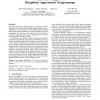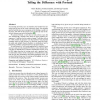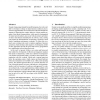ASPLOS
2012
ACM
12 years 7 months ago
2012
ACM
Multithreaded programs often suffer from synchronization bugs such as atomicity violations and deadlocks. These bugs arise from complicated locking strategies and ad hoc synchroni...
ASPLOS
2012
ACM
12 years 7 months ago
2012
ACM
Emerging fast, non-volatile memories (e.g., phase change memories, spin-torque MRAMs, and the memristor) reduce storage access latencies by an order of magnitude compared to state...
ASPLOS
2012
ACM
12 years 7 months ago
2012
ACM
Numerous tools have been proposed to help developers fix software errors and inefficiencies. Widely-used techniques such as memory checking suffer from overheads that limit thei...
ASPLOS
2012
ACM
12 years 7 months ago
2012
ACM
Disciplined approximate programming lets programmers declare which parts of a program can be computed approximately and consequently at a lower energy cost. The compiler proves st...
ASPLOS
2012
ACM
12 years 7 months ago
2012
ACM
Emerging scale-out workloads require extensive amounts of computational resources. However, data centers using modern server hardware face physical constraints in space and power,...
ASPLOS
2012
ACM
12 years 7 months ago
2012
ACM
Even though most data races are harmless, the harmful ones are at the heart of some of the worst concurrency bugs. Alas, spotting just the harmful data races in programs is like �...
ASPLOS
2012
ACM
12 years 7 months ago
2012
ACM
Despite a burgeoning demand for parallel programs, the tools available to developers working on shared-memory multicore processors have lagged behind. One reason for this is the l...
ASPLOS
2012
ACM
12 years 7 months ago
2012
ACM
Traditional storage systems provide a simple read/write interface, which is inadequate for low-locality update-intensive workloads because it limits the disk scheduling flexibili...
ASPLOS
2012
ACM
12 years 7 months ago
2012
ACM
To accomplish frequent, simple tasks with high efficiency, it is necessary to leverage low-power, microcontroller-like processors that are increasingly available on mobile systems...



